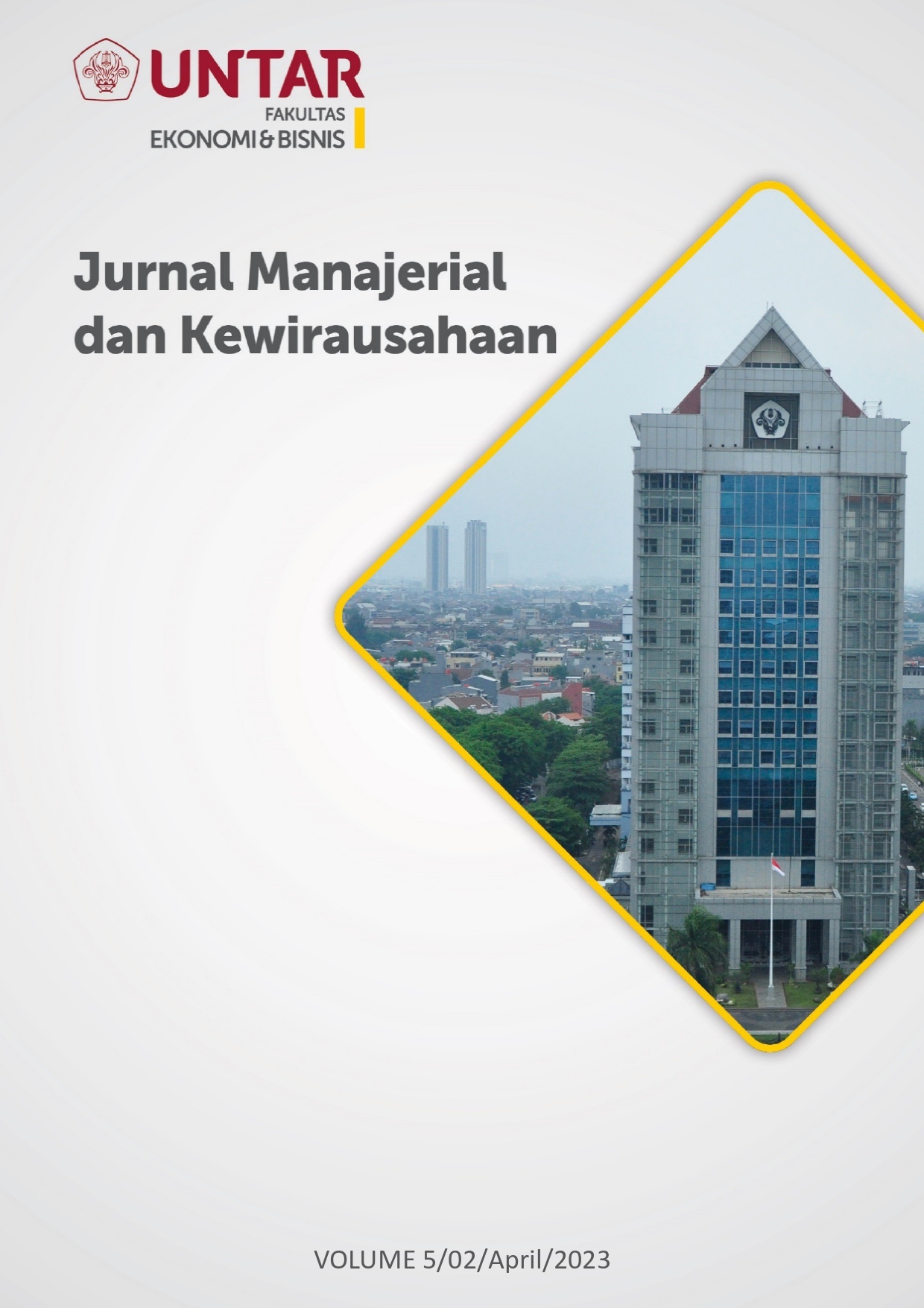Pengaruh Sikap Pribadi, Norma Subyektif, dan Kontrol Perilaku yang Dirasakan terhadap Intensi Berwirausaha
Main Article Content
Abstract
Indonesia merupakan negara berkembang yang memiliki jumlah penduduk yang sangat banyak, serta memiliki sumber daya alam yang melimpah. Namun Indonesia saat ini belum bisa dipisahkan dari masalah-masalah sosial yang ada di asyarakat terutama masalah sosial ekonomi yaitu pengangguran. Penelitian ini dilakukan dengan tujuan untuk menguji secara empiris pengaruh sikap pribadi, norma subyektif, dan kontrol perilaku yang dirasakan terhadap intensi berwirausaha. Metode yang digunakan dalam penelitian ini adalah kuantitatif deskriptif. Teknik pemilihan sampel menggunakan non probability sampling dengan metode purposive sampling. Pengumpulan data menggunakan google form secara online dengan jumlah responden 172 yang antara lain: Universitas Tarumanagara, Universitas Bina Nusantara, Trisakti School of Management, dan Universitas Mercu Buana. Data diolah menggunakan SmartPLS 3. Hasil penelitian ini menunjukkan sikap pribadi berpengaruh positif dan signifikan terhadap intensi berwirausaha, Norma Subyektif tidak berpengaruh positif dan signifikan terhadap intensi berwirausaha, kontrol perilaku yang dirasakan berpengaruh positif dan signifikan terhadap intensi berwirausaha.
Indonesia is a developing country with a very large population and abundant natural resources. However, Indonesia is currently inseparable from social problems that exist in society, especially socio-economic problems, namely emergency response. This research was conducted with the aim of empirically examining the effect of personal attitudes, subjective norms, and perceptions of behavioral control on entrepreneurial intensity. The method used in this research is causal quantitative. The sample selection technique uses non-probability sampling with a purposive sampling method. Data collection used the online google form with a total of 172 respondents including: Universitas Tarumanagara, Universitas Bina Nusantara, Trisakti School of Management, and Universitas Mercu Buana. Data were processed using SmartPLS 3. The results of this study show: Personal Attitude has a positive and significant effect on entrepreneurial intensity, Subjective Norms has a positive and not significant effect on entrepreneurial intensity, perceived behavioral control has a positive and significant effect on entrepreneurial intensity.
Article Details
Section

This work is licensed under a Creative Commons Attribution-NonCommercial-ShareAlike 4.0 International License.
This work is licensed under a Jurnal Muara Ilmu Ekonomi dan Bisnis Creative Commons Attribution-ShareAlike 4.0 International License.,/p>
References
Aga, M. K., & Singh, A. (2022). The Role of Entrepreneurship Education on Student Entrepreneurial Intentions: Mediating Effect of Attitude, Subjective Norms, and Perceived Behavioral Control. Journal of Business and Management 28(1), 31-65.
Alin, L. D., & Dil, E. (2022). Determinants of Somali Student's Entrepreneurial Intention : The Case Study of University Students in Mogadishu. Eskisehir Osmangazi Universitesi Haziran 23(1), 130-142.
Anggles, S. N., & Memarista, G. (2017). Faktor - Faktor yang Mempengaruhi Niat Mahasiswa untuk Berwirausaha. Agora 5(1), 1-8.
Asmuruf, T. A. & Soelaiman, L. (2021). Entrepreneurship intentions among vocational school students in Sorong Regency-West Papua. in Proceedings of the 3rd Tarumanagara International Conference on the Applications of Social Sciences and Humanities (TICASH 2021), 1301-1306. https://doi.org/10.2991/assehr.k.220404.208
Ayuningtyas, N. N. (2019). Pengaruh Inflasi dan Pertumbuhan Penduduk Terhadap Tingkat Pengangguran di Kota Samarinda. Jurnal Ilmu Ekonomi Universitas Mulawarman 3(4), 1-12.
Dermawan, M. Y., & Warmika, G. K. (2016). Pengaruh Norma Subyektif, Personal Attitude, Perceived Behavioral Control, dan Aspek Psikologis Terhadap Minat Berwirausaha (Entrepreneurial Intention). E-Jurnal Manajemen Umud 5(7), 4660-4689.
Disnaker, A. (2019, Febuari 25). Retrieved from https://disnaker.bulelengkab.go.id/informasi/detail/artikel/banyaknya-pengangguran-karana-kurangnya-pelatihan-keterampilan-kerja-11
Etrata, A. E., & Raborar, J. L. (2022). The Filipino Generation Z's Entrepreneurial Intention : What Drives Their Business Mindedness. Research In Business & Social Science 11(2), 1-11.
Ghozali, I., & Latan, H. (2020). Partial Least Squares Konsep, Teknik dan Aplikasi Menggunakan Programm Smartpls 3.0 Untuk Penelitian Empiris. Semarang: Universitas Diponegoro.
Hair, J. F., Hult, G. T., Ringle, C. M., & Sarstedt, M. (2017). a Primer on Partial Least Squares Structural Equation Modeling (PLS-SEM) Second Edition. United States of America: Sage Publications.
Heale, R., & Twycross, A. (2015). Validity and Reliability in Quantitative Studies. Evid Based Nurse. Evid Based Nurse 18(3), 66-67.
Hutabarat, Z. (2020). Pengaruh Theory of Planned Behavior Terhadap Entrepreneurial Intention Mahasiswa di Tangerang. Ultima Management 12(1), 159-174.
Koveos, P. (2016). The Importance of Entrepreneurship. Journal of Developmental Entrepreneurship 21(3), 1-3.
Loria, A. & Rodhiah. (2020). Pengaruh Personal Attitude, Subjective Norm, dan Perceived Behavioral Control terhadap Entrepreneurial Intention. Jurnal Manajerial dan Kewirausahaan, 2(3), 653-661. https://doi.org/10.24912/jmk.v2i3.9577
Malhotra, N. K., Nunan, D., & Birks, D. F. (2017). Marketing Research An Applied Approach Fifth Edition. United Kingdom: Pearson.
Rahim, A. R., & Basir, B. (2019). Peran Kewirausahaan Dalam Membangun Ketahanan Ekonomi Bangsa. Journal Economic Resource, 34-39.
Ramos, D., Madeira, M., & Duarte, F. (2020). Entrepreneurship Education and Entrepreneurial Intention: The Case of Portugal. Economy of Region 16(1), 157-170.
Soelaiman, L., Puspitowati, I., & Selamat, F. (2022). Peran model panutan terhadap intensi berwirausaha mahasiswa melalui penerapan teori perilaku terencana. Jurnal Muara Ilmu Ekonomi dan Bisnis, 6(2), 320-329. https://doi.org/10.24912/jmieb.v6i2.20387
Su, Y., Zhu, Z., Chen, J., Jin, J., Jin, Y., Wang, T., Lin, C. L., & Xu, D. (2021). Factors Influencing Entrepreneurial Intention of University Students in China: Integrating the Perceived University Support and Theory of Planned Behavior. Sustainability 13(1), 1-21.
Sugiyono. (2018). Metode Penelitian Kuantitatif, Kualitatif, dan R&D. Bandung: Alfabeta.
Usman, B., & Yennita. (2019). Understanding the entrepreneurial intention among international students in Turkey. Journal of Global Entrepreneurship Research 9(10), 1-21.

